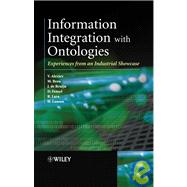
Note: Supplemental materials are not guaranteed with Rental or Used book purchases.
Purchase Benefits
Looking to rent a book? Rent Information Integration with Ontologies Experiences from an Industrial Showcase [ISBN: 9780470010488] for the semester, quarter, and short term or search our site for other textbooks by Alexiev, Vladimir; Breu, Michael; de Bruijn, Jos; Fensel, Dieter; Lara, Ruben; Lausen, Holger. Renting a textbook can save you up to 90% from the cost of buying.
Professor Fensel is the scientific director of DERI at the National University of Ireland, Galway, based on a large grant acquired from Science Foundation Ireland (SFI). His current research interests include Ontologies, semantic web, web services, knowledge management, enterprise application integration, and electronic commerce. He is a major scientific player in the area of the semantic web and has authored and co-edited 9 books, and more than 150 publications in journals and conferences. He is associate editor of the Knowledge and Information Systems: An International Journal (KAIS), IEEE Intelligent Systems, the Electronic Transactions on Artificial Intelligence (ETAI), Web Intelligence and Agent Systems (WIAS), Elsevier's Journal on Web Semantics: Science, Services and Agents on the World Wide Web and the Lecture Notes in Computer Science (LNCS) subline entitled "Semantics in Data Management".
|
|||
|
|||
|
|||
|
|||
|
|||
|
|||
|
|||
|
|||
|
|||
|
|||
|
|||
|
|||
|
|||
|
|||
|
|||
|
|||
|
|||
|
|||
|
|||
|
|||
|
|||
|
|||
|
|||
|
|||
|
|||
|
|||
|
|||
|
|||
|
|||
|
|||
|
|||
|
|||
|
|||
|
|||
|
|||
|
|||
|
|||
|
|||
|
|||
|
The New copy of this book will include any supplemental materials advertised. Please check the title of the book to determine if it should include any access cards, study guides, lab manuals, CDs, etc.
The Used, Rental and eBook copies of this book are not guaranteed to include any supplemental materials. Typically, only the book itself is included. This is true even if the title states it includes any access cards, study guides, lab manuals, CDs, etc.